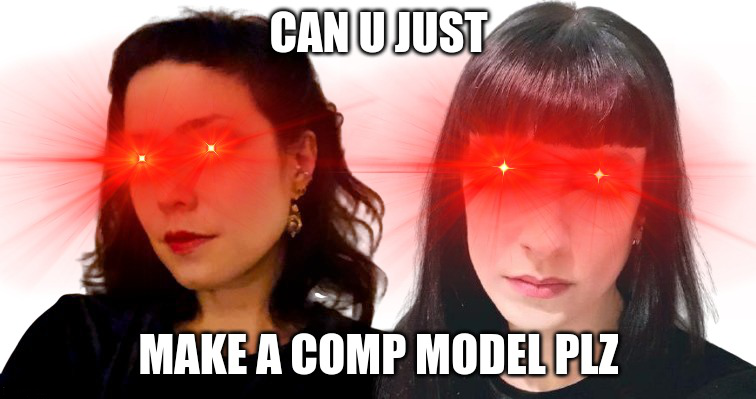As an aged modeller (JK but I& #39;ve been doing this for 10+ years LMAOSOB), I& #39;m gonna share some basics I think everybody, ESP JUNIOR PEOPLE, in cognitive science, psychology & neuroscience should know!
Also hi this& #39;s what modellers (I & @andrea_e_martin) can look like!
 https://abs.twimg.com/emoji/v2/... draggable="false" alt="🧵" title="Thread" aria-label="Emoji: Thread">
https://abs.twimg.com/emoji/v2/... draggable="false" alt="🧵" title="Thread" aria-label="Emoji: Thread"> https://abs.twimg.com/emoji/v2/... draggable="false" alt="🧵" title="Thread" aria-label="Emoji: Thread">
https://abs.twimg.com/emoji/v2/... draggable="false" alt="🧵" title="Thread" aria-label="Emoji: Thread"> https://abs.twimg.com/emoji/v2/... draggable="false" alt="🧵" title="Thread" aria-label="Emoji: Thread">
https://abs.twimg.com/emoji/v2/... draggable="false" alt="🧵" title="Thread" aria-label="Emoji: Thread">
1/
Also hi this& #39;s what modellers (I & @andrea_e_martin) can look like!
1/
1. Even a 100% flawed model can be useful.
So even a model that is unhinged from empirical evidence can be useful in that it can highlight what it is we do actually believe & what "unhinged" means.
We talk about it a bit here as well & cite examples: https://doi.org/10.31234/osf.io/rybh9
2/">https://doi.org/10.31234/...
So even a model that is unhinged from empirical evidence can be useful in that it can highlight what it is we do actually believe & what "unhinged" means.
We talk about it a bit here as well & cite examples: https://doi.org/10.31234/osf.io/rybh9
2/">https://doi.org/10.31234/...
2. Nobody/no modeller understands a totally novel to us modelling methodology by just reading once the first paper we have seen that uses it. We read papers many times and read many related models.
If I get a model immediately, it& #39;s because I have seen similar stuff before.
3/
If I get a model immediately, it& #39;s because I have seen similar stuff before.
3/
3. Models, like theories, are most likely to be kinda wrong & it& #39;s our job to admit that &, if we so wish & in an ideal world, refine them or get rid of them. People who behave otherwise are disingenuous & being megalomaniacal about their body of work.
You have been warned.
4/
You have been warned.
4/
4. There is bad modelling. In the same way work that avoids modelling avoids theory building, as we say in: https://doi.org/10.31234/osf.io/rybh9">https://doi.org/10.31234/... — a lot of modelling avoids spec writing, as we say in: https://doi.org/10.1016/j.cogsys.2013.05.001!
5/">https://doi.org/10.1016/j...
5/">https://doi.org/10.1016/j...
It is scientifically dubious, even tho sadly common in modelling papers to not write a spec & just talk about code/superficial implementation details. It& #39;s nigh on useless, i.e., bad modelling and theory building, to do this and arguably lazy. See: https://doi.org/10.1016/j.cogsys.2013.05.001
6/">https://doi.org/10.1016/j...
6/">https://doi.org/10.1016/j...
What @andrea_e_martin and I propose is that we as (cognitive) scientists have to engage with every step in path our model. That doesn& #39;t mean everybody needs to be a modeller or that every modeller needs to collect data, or anything THIS dramatic...
7/
7/
...just that since science is the process of building theories of the world, we should strive to do just that.
More here: https://www.youtube.com/watch?v=8Aa9_6ahO48&ab_channel=OliviaGuest
7/">https://www.youtube.com/watch...
More here: https://www.youtube.com/watch?v=8Aa9_6ahO48&ab_channel=OliviaGuest
7/">https://www.youtube.com/watch...

 Read on Twitter
Read on Twitter https://abs.twimg.com/emoji/v2/... draggable="false" alt="🧵" title="Thread" aria-label="Emoji: Thread">https://abs.twimg.com/emoji/v2/... draggable="false" alt="🧵" title="Thread" aria-label="Emoji: Thread">1/" title="As an aged modeller (JK but I& #39;ve been doing this for 10+ years LMAOSOB), I& #39;m gonna share some basics I think everybody, ESP JUNIOR PEOPLE, in cognitive science, psychology & neuroscience should know!Also hi this& #39;s what modellers (I & @andrea_e_martin) can look like!https://abs.twimg.com/emoji/v2/... draggable="false" alt="🧵" title="Thread" aria-label="Emoji: Thread">https://abs.twimg.com/emoji/v2/... draggable="false" alt="🧵" title="Thread" aria-label="Emoji: Thread">https://abs.twimg.com/emoji/v2/... draggable="false" alt="🧵" title="Thread" aria-label="Emoji: Thread">1/">
https://abs.twimg.com/emoji/v2/... draggable="false" alt="🧵" title="Thread" aria-label="Emoji: Thread">https://abs.twimg.com/emoji/v2/... draggable="false" alt="🧵" title="Thread" aria-label="Emoji: Thread">1/" title="As an aged modeller (JK but I& #39;ve been doing this for 10+ years LMAOSOB), I& #39;m gonna share some basics I think everybody, ESP JUNIOR PEOPLE, in cognitive science, psychology & neuroscience should know!Also hi this& #39;s what modellers (I & @andrea_e_martin) can look like!https://abs.twimg.com/emoji/v2/... draggable="false" alt="🧵" title="Thread" aria-label="Emoji: Thread">https://abs.twimg.com/emoji/v2/... draggable="false" alt="🧵" title="Thread" aria-label="Emoji: Thread">https://abs.twimg.com/emoji/v2/... draggable="false" alt="🧵" title="Thread" aria-label="Emoji: Thread">1/">
 https://abs.twimg.com/emoji/v2/... draggable="false" alt="🧵" title="Thread" aria-label="Emoji: Thread">https://abs.twimg.com/emoji/v2/... draggable="false" alt="🧵" title="Thread" aria-label="Emoji: Thread">1/" title="As an aged modeller (JK but I& #39;ve been doing this for 10+ years LMAOSOB), I& #39;m gonna share some basics I think everybody, ESP JUNIOR PEOPLE, in cognitive science, psychology & neuroscience should know!Also hi this& #39;s what modellers (I & @andrea_e_martin) can look like!https://abs.twimg.com/emoji/v2/... draggable="false" alt="🧵" title="Thread" aria-label="Emoji: Thread">https://abs.twimg.com/emoji/v2/... draggable="false" alt="🧵" title="Thread" aria-label="Emoji: Thread">https://abs.twimg.com/emoji/v2/... draggable="false" alt="🧵" title="Thread" aria-label="Emoji: Thread">1/">
https://abs.twimg.com/emoji/v2/... draggable="false" alt="🧵" title="Thread" aria-label="Emoji: Thread">https://abs.twimg.com/emoji/v2/... draggable="false" alt="🧵" title="Thread" aria-label="Emoji: Thread">1/" title="As an aged modeller (JK but I& #39;ve been doing this for 10+ years LMAOSOB), I& #39;m gonna share some basics I think everybody, ESP JUNIOR PEOPLE, in cognitive science, psychology & neuroscience should know!Also hi this& #39;s what modellers (I & @andrea_e_martin) can look like!https://abs.twimg.com/emoji/v2/... draggable="false" alt="🧵" title="Thread" aria-label="Emoji: Thread">https://abs.twimg.com/emoji/v2/... draggable="false" alt="🧵" title="Thread" aria-label="Emoji: Thread">https://abs.twimg.com/emoji/v2/... draggable="false" alt="🧵" title="Thread" aria-label="Emoji: Thread">1/">



